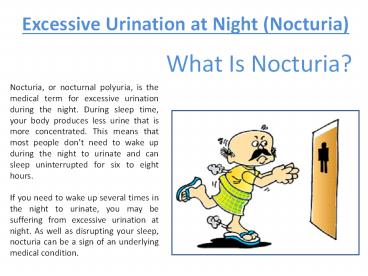Excessive Urination at Night (Nocturia) PowerPoint PPT Presentation
Title: Excessive Urination at Night (Nocturia)
1
Excessive Urination at Night (Nocturia)
- What Is Nocturia?
Nocturia, or nocturnal polyuria, is the medical
term for excessive urination during the night.
During sleep time, your body produces less urine
that is more concentrated. This means that most
people dont need to wake up during the night to
urinate and can sleep uninterrupted for six to
eight hours. If you need to wake up several
times in the night to urinate, you may be
suffering from excessive urination at night. As
well as disrupting your sleep, nocturia can be a
sign of an underlying medical condition.
2
What Are the Causes of Nocturia?
- Causes of nocturia range from lifestyle choices
to medical conditions. Nocturia is most common
among older adults, but it can occur at any age.
3
Medical Conditions
- A variety of medical conditions can cause
nocturia. One of the most common causes of
nocturia is a urinary tract infection (UTI) or
bladder infection. These infections cause
frequent burning sensations and urgent urination
throughout the day and night, and treatment
usually requires antibiotics. - Other medical conditions that can cause nocturia
include - infection or enlargement of the prostate bladder
prolapse overactive bladder (OAB) syndrome tumors
of the bladder, prostate, or pelvic area diabetes
anxiety kidney infection - edema, or swelling, of the lower legs
- neurological disorders, such as multiple
sclerosis (MS), Parkinsons disease, or spinal
cord compression - Nocturia is also common in people with organ
failure typically either heart or liver failure
and those who suffer from diabetes.
4
- Pregnancy
- Nocturia can be an early symptom of pregnancy.
This can develop at the beginning of pregnancy,
but is more common later, when the womb presses
against the bladder. - Sleep Apnea
- Nocturia can be a symptom of obstructive sleep
apnea. This can occur even if the bladder is not
full. Once the sleep apnea is controlled, the
nocturia usually goes away. - Medications
- Some medications may cause nocturia as a side
effect. This is particularly true of diuretics
(water pills), which are prescribed to treat high
blood pressure. - You should seek emergency medical care from a
doctor if you lose the ability to urinate, or if
you can no longer control urination.
5
Lifestyle Choices
- Another common cause of nocturia is excessive
fluid consumption. Alcohol and caffeinated
beverages are diuretics, which means that
drinking them causes your body to produce more
urine. Consuming either alcohol or caffeinated
beverages in excess can lead to waking up and
needing to urinate at night. - Other people who have nocturia have simply
developed a habit of waking up during the night
to urinate.
6
How Is Nocturia Diagnosed?
- Diagnosing the cause of nocturia can be
difficult. Your doctor will need to ask a variety
of questions. It can be useful to maintain a
diary for a few days, recording what you drink
and how much, along with how often you go to the
toilet. - Questions your doctor may ask you include
- When did nocturia start?
- How many times a night do you have to urinate?
- Are you producing less urine than you did before?
7
- Do you have accidents or have you wet the bed?
- Does anything make the problem worse?
- Do you have any other symptoms?
- What medications are you taking?
- Do you have a family history of bladder problems
or diabetes? - You may also undergo testing such as
- blood sugar test (to check for diabetes)
- blood urea test
- urine culture
- fluid deprivation test
- imaging tests, such as ultrasounds
8
How Can Nocturia Be Prevented?
- Nocturia can be a difficult and sometimes
embarrassing condition to live with, but there
are steps you can take to lessen its impact on
your life. - Reducing the amount you drink before going to bed
can help prevent you from having to urinate at
night. Avoiding drinks that contain alcohol and
caffeine may also help, as can urinating before
you go to bed. Some food items act as diuretics
as well, like chocolate, spicy foods, and
artificial sweeteners. Kegel exercises can help
strengthen your pelvic muscles and improve
bladder control. - Pay close attention to what exacerbates your
symptoms so you can try to modify your habits
accordingly. Some people find it helpful to keep
a diary of what they drink and when.
9
- Click here to know morewww.uridoc.info
10
- THANK YOU

